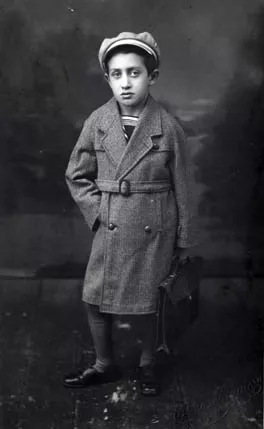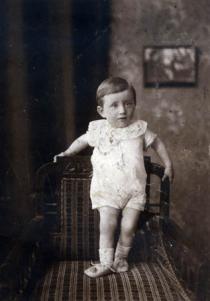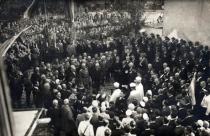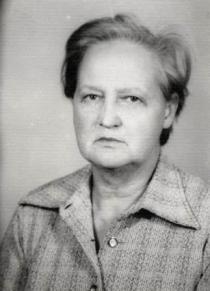Mois Merkado Natan as a student at the Jewish school in Ruse
The photo was taken at the time when I was a student at the Jewish school in Ruse in 1938.
I haven't had a nanny, but for one year I attended the 'Gan Yeladim' kindergarten at the Jewish school. It was one year before I started school. 'Gan' means garden in Ivrit, while 'yeladim' stands for 'children'. After that I studied in the Jewish primary and secondary school. I was very good at mathematics. When uncle Bucco made us do sums, he would always ask me first what the answer was. This teacher whom we learned a lot of things from was a mathematician. From him we learned many sayings, many things, for example that the great violinist Bronislaw Huberman was a Jew. [Huberman, Bronislaw (1882-1947): a great violinist of the 20th century, born in Poland. He was highly acclaimed for his strongly individual interpretations.] We learned which famous people were of Jewish origin, he used to tell us about the Jewish lifestyle and traditions. He was a great man, a great pedagogue; for us he was not only our teacher in mathematics. His classes were exceptional. Later, every time I was in Ruse after the war I visited him until he passed away.
I haven't had private lessons in music, nor in foreign languages; I studied French at the high school. My friends at school were Jews and Bulgarians, especially after I entered the Union of Young Workers (UYW). That happened after the war on the USSR was declared on 22th June 1941. I was in the sixth grade in the high school two years before graduation. However, the next year I was expelled from school. We were locked up within the Jewish neighborhood and we didn't have any out-of-school contacts. We used to gather in Tahir's confectionery before the curfew hour. At weekends we gathered in someone's house - we used to organize jours [i.e. youth parties] then as we used to call them. We gathered boys and girls, danced a little, but most of the time we discussed things and had arguments - we were already members of the UYW. We didn't drink alcohol, we listened to music only if there was a gramophone or a radio at the place where we gathered. We used our free time to study and read.
I did sports at 'Maccabi' - there were various competitions there. We used to play volleyball, table tennis, and two times a week we did gymnastics. I had a friend who used to come home and stayed with us for the night. From 6 a.m. to 9 a.m. we prepared our lessons. At 9 a.m. we were at 'Maccabi' where we played until 11:30. After that we used to have lunch before we go to school. The Jews in Ruse were not communists regarding their social status - we were rather intellectually attracted by the idea. As I already told you I read the 'Brown Book' and I knew the Hitlerism persecuted Jews and communists. In Ruse there were between 70 and 80 people, living in the Jewish street, who were organized in the UYW. I remember that we asked for special permission from the State Security Service to perform chamber concerts in the Jewish school. And when the day of the first one came we shuddered with fear because the head of the State Security Service and three or five agents came to listen to our music - but it was because in Ruse there was no other place to listen to music then. That was one of the most significant cultural events in the town during the war. Apart from gathering to someone's house for a party the other thing to do was to go together with our parents to eat kebapcheta [traditional grilled meatballs] in the evenings - in our street there was a kebapche eatery, that was owned by Jews. The eatery was not kosher.
We couldn't go on summer holidays after 1941 any more. Before that I hadn't gone on holiday with my friends, because my father didn't allow me to go on trips - he was very strict and meticulous in this respect, he always wanted to know where we were. Anti-Jewish laws were introduced in 1941 - the yellow star and the curfew hour. Now there are some disputes as to whether we lived in a ghetto or not - well we were in Ruse and 9 o'clock was the curfew. We could go out of there only for two hours a day - from the beginning it was not so strictly observed, but later the situation grew tenser. During the day we were allowed to go to the market, in a cafe and in a confectionery's in the Jewish neighborhood, but we were not allowed to go to the other parts of the town. In 1942 a policeman liked the apartment where we were living and he drove us out from there. We used to live in the house of the Spanish ambassador Aftalion, who left and asked us to keep his home. He was a Jew, however, so the state confiscated the house and kicked us out. [No information for such person is available. In the same year, chief of the Spanish mission to Sofia was Julio Palencia i Alvaces (11.12.1940-27.10.1943). He is known for his active efforts for freeing dozens of Jews, as Spanish citizens, from compulsory work and civil mobilization in Bulgaria during the years when the anti-Jewish legislation was in force. He actively assisted the process of issuing Spanish passports and handled the emigration issues of Bulgarian Jews, who went to America through Spain. In order to save a Jewish family in Plovdiv, Palencia even adopted their child. As of 27th October 1943, Ramon Maria de Pudjadas was the plenipotentiary minister of Spain to Bulgaria. Aftalion was most probably a Spanish consul, but the name of the town he went to was not mentioned - most probably this was Kavala, where the Spanish consul was Jew against whom Germans undertook repressive measures.]





























